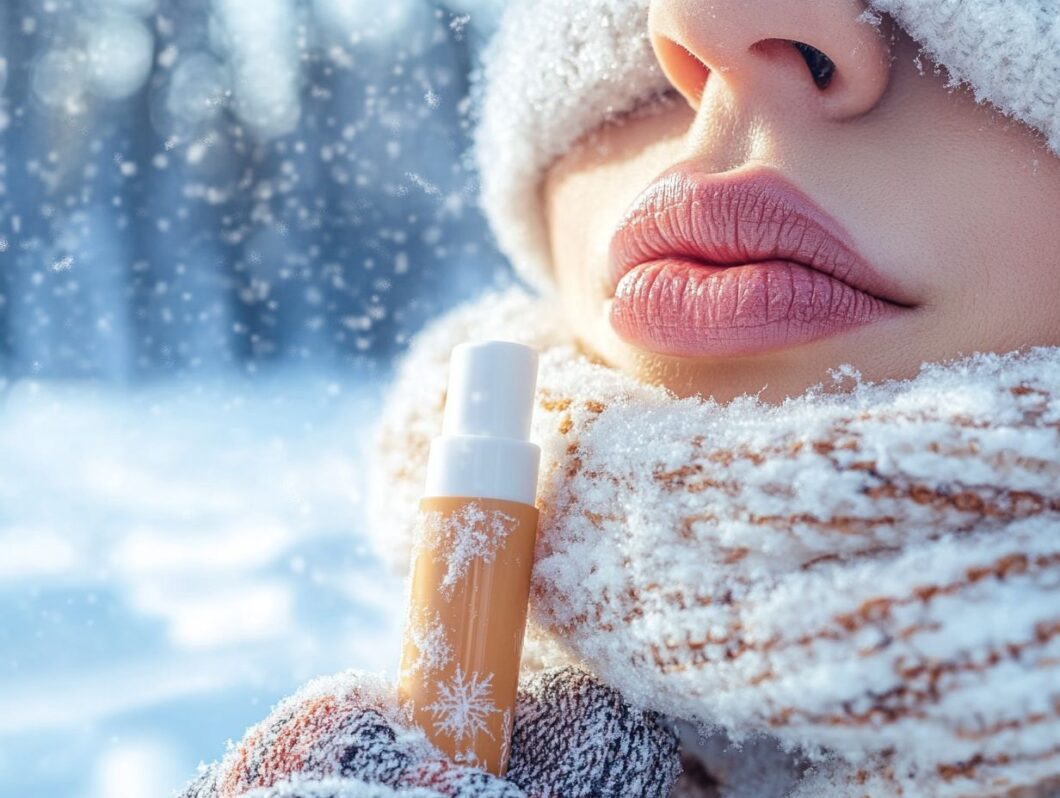As winter approaches and temperatures begin to drop, I often encounter the common challenge of chapped lips. The cold, dry air can significantly impact my skin, leaving my lips feeling sore, cracked, and uncomfortable. Understanding the causes and symptoms of chapped lips is essential for effectively addressing this issue.
In this guide, I will explore effective prevention strategies, treatment options, and key tips for protecting my lips from harsh winter conditions. Additionally, I will provide insights on selecting the right lip care products to ensure my smile remains healthy and hydrated throughout the season.
Key Takeaways:
Understanding Chapped Lips in Cold Weather
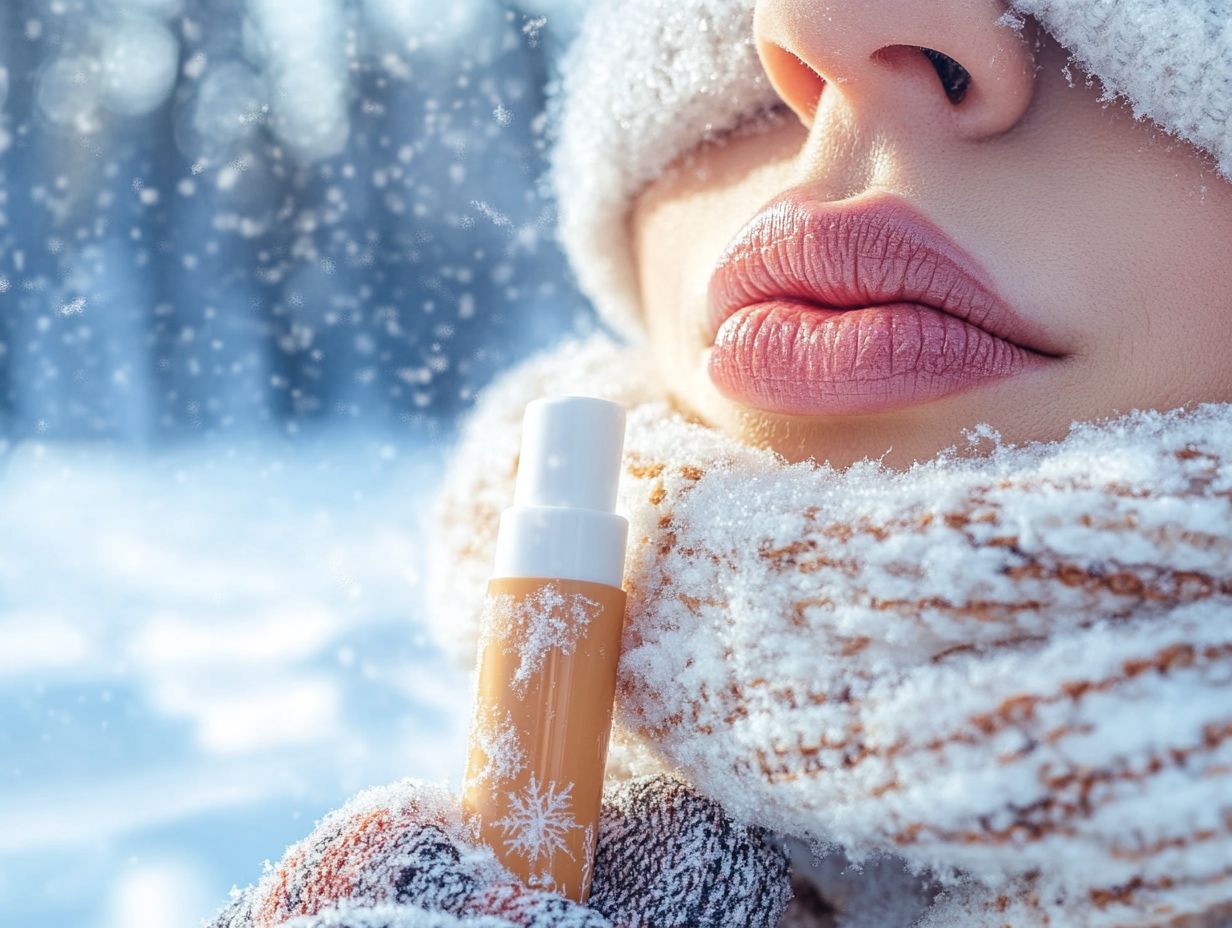
Understanding chapped lips in cold weather is essential for maintaining lip health, as I have observed that cold conditions can lead to dry lips, increased irritation, and even conditions like contact cheilitis.
Environmental factors such as low humidity, dry air, and exposure to harsh winds significantly heighten the risk of developing chapped lips.
I find that identifying symptoms early on, such as cracking, peeling skin, or the possibility of cold sores—often aggravated by vitamin deficiencies, particularly vitamin B12—is crucial.
By recognizing these causes, I can take the necessary precautions to prevent dry lips and maintain a healthy lip barrier.
Causes and Symptoms
Chapped lips can arise from various causes, including environmental factors, vitamin deficiencies, and habitual behaviors that irritate the lips.
Among the most common environmental contributors are dry air and cold weather, which can deplete the delicate skin of moisture, resulting in discomfort. I often observe signs such as flakiness, cracking, and even bleeding as the lips become more susceptible to these changes in climate.
Conditions like contact cheilitis may develop from allergic reactions to certain products, while cold sores are another concern linked to viral infections.
To maintain optimal hydration and prevent future discomfort, I find it essential to implement proactive lip care measures, such as applying hydrating balms and ensuring adequate water intake.
Preventing Chapped Lips
Preventing chapped lips is essential, particularly in cold weather, and it necessitates the adoption of healthy lip habits and effective care strategies to maintain moisture and avoid dryness.
By utilizing a combination of quality moisturizing ingredients, ensuring adequate oral hydration, and implementing preventive measures, I can significantly decrease the risk of lip irritation. Regularly applying lip balms that contain hydrating and occlusive agents helps to strengthen the skin barrier and form a protective layer against environmental factors.
Through proactive lip care, I can ensure that my lips remain soft and supple, even in challenging conditions.
Effective Lip Care Habits
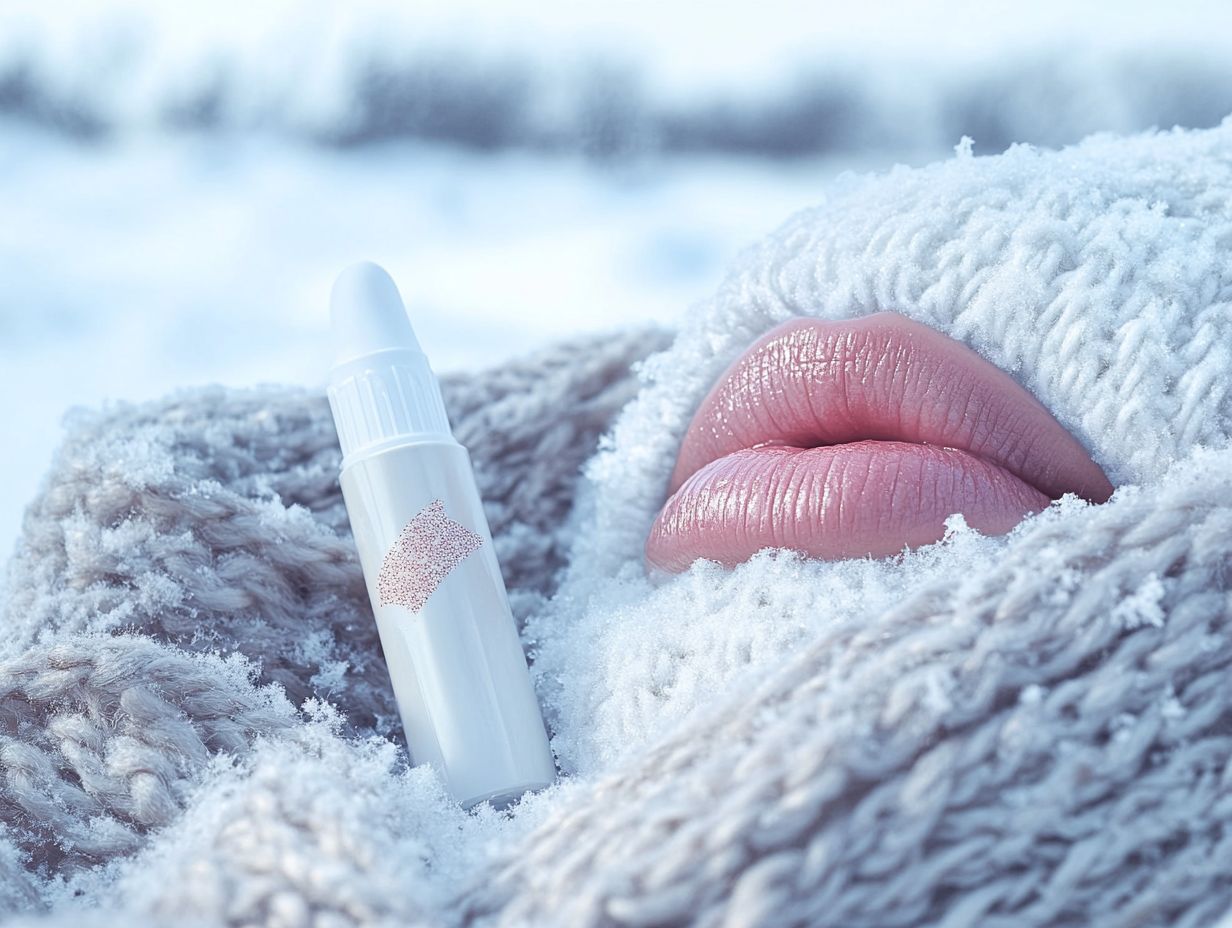
Maintaining effective lip care habits is essential for keeping my lips hydrated and healthy, particularly during cold weather when the risk of dryness increases.
To achieve this, I incorporate soothing lip balms enriched with moisturizing ingredients such as shea butter, coconut oil, and beeswax. Staying properly hydrated by drinking plenty of water throughout the day is also crucial in preventing chapped lips.
When selecting lip care products, I prioritize those enriched with humectants, as they attract moisture and provide lasting hydration. I make it a point to avoid lip products containing harsh chemicals or fragrances, as these can worsen dryness.
By following these best practices, I can ensure my lips remain soft and supple throughout the year.
Treating Chapped Lips
Effectively treating chapped lips involves exploring a variety of options, from home remedies to specialized lip treatments that promote healing and hydration.
I find that utilizing lip products with emollient ingredients and occlusive lip masks can offer immediate relief while enhancing the skin’s protective barrier, which is essential for countering the effects of dry air and cold weather.
Many dermatology experts suggest using thick balms infused with healing properties to soothe and restore cracked skin.
Therefore, it’s crucial for me to select products that cater to the specific needs of chapped lips.
Home Remedies and Medical Treatments
Home remedies for chapped lips can range from simple kitchen ingredients to more specialized lip treatments recommended by dermatologists.
I often find that natural solutions, such as soothing oils like coconut and almond oil, are effective in hydrating and locking in moisture. Honey is another excellent option; its renowned healing properties help attract and retain moisture, while sugar scrubs provide gentle exfoliation to remove dead skin and reveal healthier lips beneath.
While these home remedies can offer effective relief for mild cases, it’s crucial to recognize when to seek professional assistance if conditions do not improve. Dermatologists may recommend medicated ointments or creams containing powerful ingredients specifically designed to deliver deeper hydration and healing, particularly for chronic or severely chapped lips.
Thus, understanding the balance between DIY treatments and expert advice is essential for achieving optimal lip health.
Protecting Lips from Harsh Weather Conditions
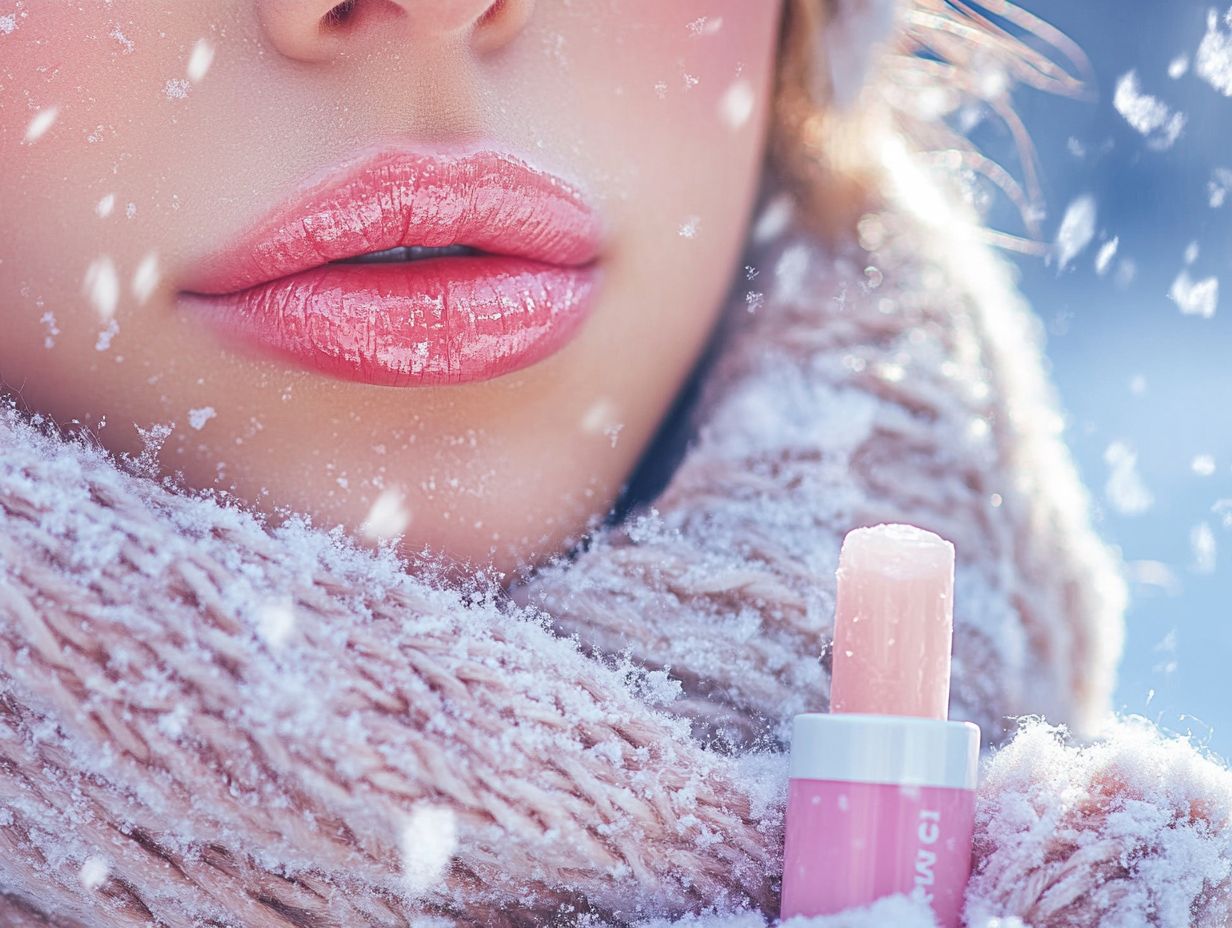
Protecting my lips from harsh weather conditions is essential to prevent chapped lips, particularly during the winter months when the air tends to be dry and cold.
I find that using lip products containing occlusive agents creates a protective barrier that safeguards against environmental factors contributing to dryness and irritation.
Additionally, I adhere to winter skincare tips, such as applying lip balm frequently and avoiding the habit of lip-licking, to further enhance my lip protection.
By understanding how to select the right products, I can significantly improve my lip health and comfort during the colder seasons.
Winter Skincare Tips
Winter skincare tips are vital for maintaining healthy lips in the face of dry air and harsh conditions that often result in chapped lips.
To effectively address these challenges, I prioritize choosing lip products that are enriched with moisturizing ingredients such as shea butter, coconut oil, and vitamin E. These components are well-regarded for their hydrating and soothing properties, as they create a protective barrier that helps prevent moisture loss.
Incorporating a nourishing lip balm into my daily routine makes a noticeable difference, particularly when applied before venturing outdoors. Additionally, I find that adjusting the frequency of application—especially after eating or drinking—can further enhance my lips’ resilience against the drying winter air.
Investing a little time in my lip care can lead to soft, healthy lips throughout the season.
Choosing the Right Lip Products
Selecting the appropriate lip products is essential for maintaining lip health, especially in harsh weather conditions that can lead to drying and cracking.
I prioritize lip products that include moisturizing ingredients, emollients, and occlusive agents, all designed to form a protective barrier.
Additionally, I pay attention to active ingredients such as hyaluronic acid and alternatives to petrolatum, which offer exceptional hydration and long-lasting moisture.
I also find that consulting dermatologist insights can provide valuable guidance in choosing lip treatments that effectively address my specific lip care needs.
Ingredients to Look For and Avoid
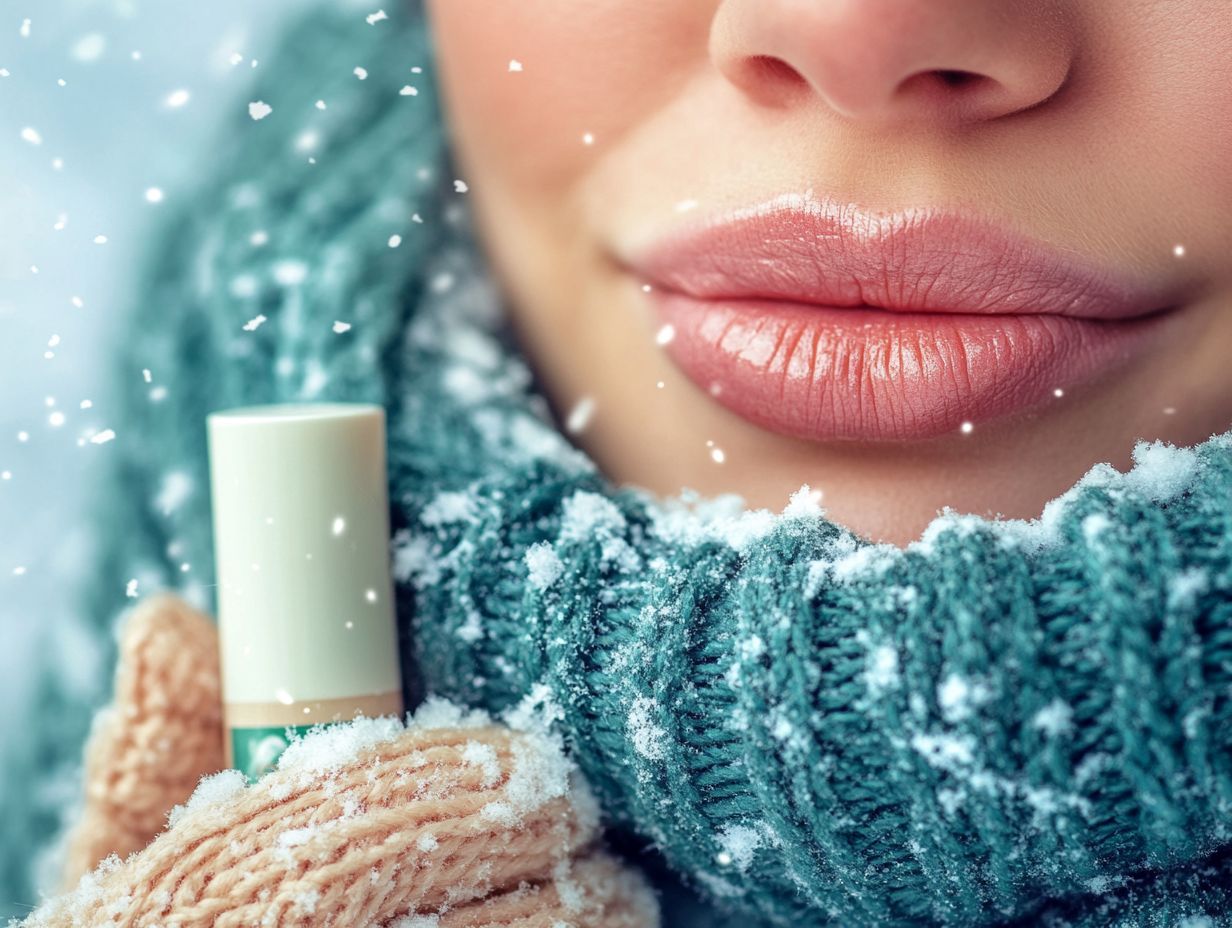
When selecting lip products, I recognize the importance of distinguishing beneficial ingredients from those that may cause irritation or dryness. A thoughtfully curated selection can greatly impact the maintenance of soft, healthy lips.
Ingredients such as shea butter, coconut oil, and beeswax are particularly effective due to their moisturizing properties, as they help lock in hydration and form a protective barrier on the skin’s surface.
Conversely, I am mindful of certain additives, such as artificial fragrances and alcohol, which can lead to discomfort and exacerbate dryness. I understand that integrating a healthy lifestyle—staying hydrated, consuming vitamins rich in antioxidants, and minimizing excessive sun exposure—also significantly contributes to lip health.
By nurturing my body, I can enhance the effectiveness of lip care products, resulting in beautifully supple lips throughout the year.
Daily Lip Care Routine for Cold Weather
I find that establishing a daily lip care routine during cold weather is essential for keeping my lips hydrated and healthy despite the harsh conditions.
This routine includes applying moisturizing lip balms enriched with hydrating ingredients throughout the day, as well as incorporating specific exfoliation techniques to prevent dead skin buildup.
Additionally, ensuring adequate liquid intake is crucial for overall hydration, which directly benefits lip health.
By consistently following these lip care practices, I can significantly reduce the likelihood of experiencing chapped lips during the winter months.
Steps to Keep Lips Healthy and Moisturized
To maintain healthy and moisturized lips, I find it essential to follow a series of effective steps that align with best practices in lip care.
This journey toward achieving luscious lips begins with selecting the right lip balm, ideally one that contains moisturizing ingredients such as shea butter, coconut oil, or beeswax. I make it a point to apply lip balm regularly, particularly before bed, ensuring that my lips receive nourishment overnight. Additionally, I incorporate gentle exfoliation into my routine once or twice a week to remove dead skin, which helps create a smoother surface.
Hydration is also crucial, so I ensure I drink adequate water throughout the day to complement the effects of the topical products. I remain mindful of environmental factors as well; protecting my lips from harsh winds or sun exposure by using a scarf or an SPF-infused balm is vital for comprehensive care.


